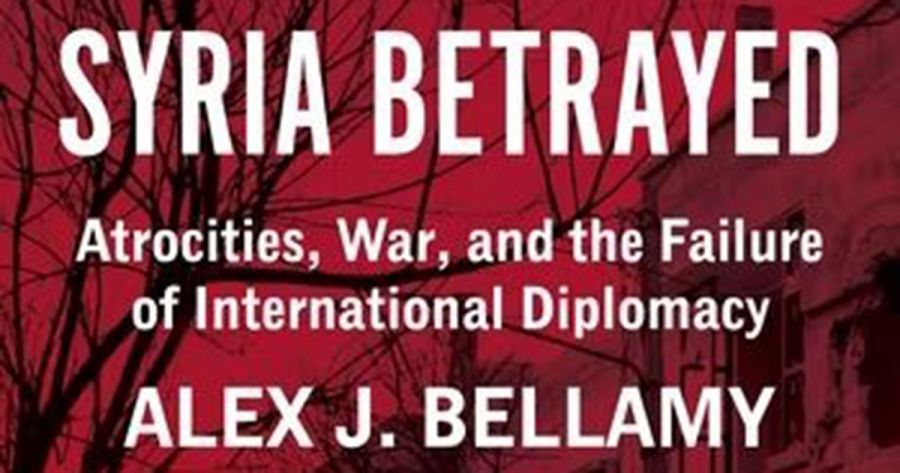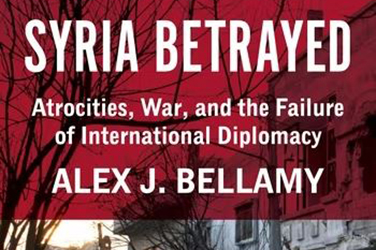
- Free Article: No
- Contents Category: Politics
- Review Article: Yes
- Article Title: Just another strategic sideshow
- Article Subtitle: Syria’s descent into carnage
- Online Only: No
- Custom Highlight Text:
As the war in Syria enters its second decade, the human scale of the catastrophe is difficult to comprehend. Shocked by the security service’s torture of children who had graffitied the words ‘Down with the regime’ on a wall in the city of Daraa in 2011, nationwide demonstrations rose up against Bashar al-Assad’s tyrannical government. When I ask my now-exiled Syrian colleagues what life was like under the Assad family, they struggle for historical parallels before agreeing that, for them, it resembled Stalin’s Soviet Union and North Korea (a regime the current president’s father, Hafez Al-Assad, looked to for inspiration).
- Featured Image (400px * 250px):

- Alt Tag (Featured Image): Tom Bamforth reviews 'Syria Betrayed: Atrocities, war, and the failure of international diplomacy' by Alex J. Bellamy
- Book 1 Title: Syria Betrayed
- Book 1 Subtitle: Atrocities, war, and the failure of international diplomacy
- Book 1 Biblio: Columbia University Press, $35 hb, 427 pp
- Book 1 Cover Small (400 x 600):

Of Syria’s pre-war population of around twenty-one million people, fourteen million people have been forcibly displaced (seven million have fled as refugees and another seven million remain displaced within Syria’s borders). In the north-west of the country, an area still controlled by opposition groups, 4,400,000 people occupy the ‘new Gaza’ – an area caught between the frontlines and an EU-funded wall that runs the length of the Turkish border. Hyperinflation, chronic shortages, and an economy controlled by the kleptocratic Assad family mean that seventy-five per cent of households across the country now cannot meet their basic needs. In what was once a middle-income country, half a million children now suffer from malnutrition and stunting, and 2.5 million children do not attend school.
Civilian suffering is a deliberate military strategy, now being practised in Ukraine. The use of chemical weapons and barrel bombs, targeting hospitals, schools, markets, and aid convoys, has defined the regime’s war on its own people. The statistics fail to convey the country’s suffering and devastation. After the murder of George Floyd in the United States, empathetic murals appeared in Syria along with his tragic last words, ‘I can’t breathe’, the local reference being to the effects of sarin gas. One colleague told me that he can no longer bear to look at the family photos he managed to salvage when he fled: too many of the people in them are dead. Every few days, local aid workers operating near the frontlines send out graphic images of dismembered bodies in bombed-out houses.
What can be described, however, is the systematic failure of what some misleadingly call the ‘international community’ to bring an end to atrocities in Syria. Alex J. Bellamy – Professor of Peace and Conflict Studies and Director of the Asia Pacific Centre for the Responsibility to Protect at the University of Queensland – has brilliantly documented how international actors with the power to bring an end to the conflict ultimately succeeded in enabling Syria’s descent into carnage. In the words of veteran peace negotiator Lakhdar Brahimi: ‘Everybody had their own agenda and the interests of the Syrian people came second, third or not at all.’
With the Security Council deadlocked by Russian and Chinese vetoes, few meaningful resolutions, except those articulating weary phrases about ‘grave concerns’, were allowed to pass. Zombie peace processes filled hotel rooms and conference venues in Geneva, meandering on even when it was clear there could be no negotiated settlement. Veteran international diplomats Kofi Annan and Lakhdar Brahimi floundered under the regime’s intransigence and the impossibility of achieving a peaceful transition of power, one that, at Russia and Iran’s insistence, left Assad in the presidency. This was the one proposition that the otherwise fractious opposition groups, with separate and disunited backers in Saudi Arabia and Qatar, could jointly oppose. Their successor as negotiator, the hapless Staffan de Mistura, introduced a policy of localised ‘de-escalation zones’ that brought temporary peace in one place while allowing Assad, operating under military advice from Iranian general Qasem Soleimani, to concentrate his forces on besieging another. The effect of this doomed peace initiative was to facilitate the regime’s military strategy. Russia and Iran provided Assad with vital political and military support, with Syrian skies controlled by the Russian air force and an annual budget in Iran of US$6 billion for military support of Syria.
The United Nations comes in for harsh criticism, not only for the inertia of the deadlocked Security Council. UN operating agencies provided material support to Assad. In 2015, for example, ninety per cent of the US$900 million in humanitarian assistance delivered in Syria passed through government hands. In 2016, the UN funded US$500 million in contracts to companies connected to the Syrian government, while ninety-six per cent of food aid went to government held areas. The Assad family’s Four Seasons Hotel in Damascus, used to accommodate UN staff, has earned them more than US$80 million since 2014. While humanitarian support to refugees in neighbouring countries has alleviated suffering, this material support in regime-held areas has enabled the Syrian government to redirect scarce resources to its military efforts. The United Nations has, as Bellamy writes, ‘aided and abetted the government’s atrocity crimes’.
Despite its own political and military objectives relating to controlling Kurdish areas in Syria, Turkey comes off as the country that has done the most for Syrians. Turkey has intervened militarily, taking on the Syrian army to create the Euphrates Shield safe zone to the north of Aleppo. It has also intervened effectively against armed extremist groups. Turkey now hosts 3,500,000 Syrian refugees, though attitudes are hardening against Syrians living in Turkey. (The threat of waves of refugees to Europe has been instrumentalised by the Turkish government in exchange mainly for financial concessions.) Bellamy criticises the lacklustre Western strategy that has failed to back up negotiated positions with credible force. How could peace negotiations succeed when Assad and, latterly, Vladimir Putin saw only military solutions?
As the international focus shifts to Ukraine, and amid growing calls for ‘normalisation’ of relations with the Assad regime, the Syrian crisis is not going away. Assad presides over a shattered state. The cost of protecting him cannot be borne forever by Russia and Iran. The haunting question at the heart of Alex J. Bellamy’s book is: ‘Why did the international legal obligations established after the Holocaust to protect civilians from exactly this type of violence amount to so little?’


Comments powered by CComment